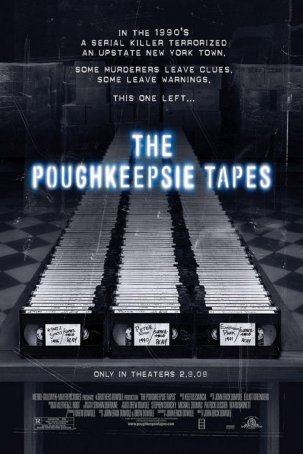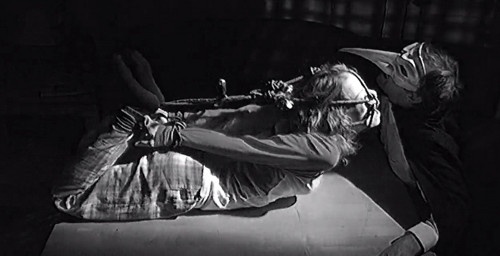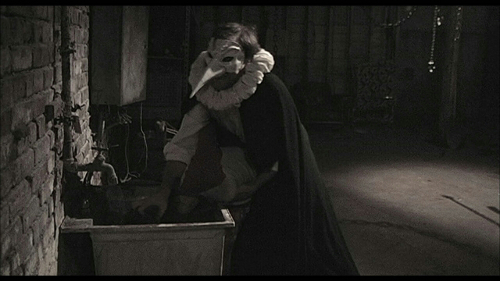Poughkeepsie Tapes, The | Reelviews Movie Reviews (original) (raw)
Poughkeepsie Tapes, The (United States, 2007)
July 11, 2024

This review contains spoilers.
The Poughkeepsie Tapes might pass muster as a curiosity if it was shorter. The film successfully captures the look and feel of those exploitative cable TV true crime stories, albeit with more explicit imagery. The problem with The Poughkeepsie Tapes is that it has little more to offer beyond that thin premise. And, unlike those cheesy documentaries, it’s entirely fictional. The storyline embedded within the faux documentary framework relies on found footage, none of which is especially interesting. There’s no one to identify with. The killer is a blank page and his primary victim isn’t much better developed. A lot of the torture that goes on occurs off-screen – we either glimpse it briefly or see its aftereffects – but the voyeuristic approach makes watching it a less-than-enjoyable experience.
The story focuses on serial killer Edward Carver (Ben Messmer), who occupies a house located in Poughkeepsie. Edward has a nasty habit of videotaping his interactions with his victims, creating a vast library of more than 800 videotapes, which police discover when they raid the house. When the cops arrive, Carver is nowhere to be found. The tapes provide a record of Carver’s descent into murderous madness, beginning with his first victim (an 8-year old girl). One woman, teenager Cheryl Dempsey (Stacy Chbosky), becomes his obsession. After slaughtering her boyfriend and abducting her, he turns her into a slave rather than killing her. Carver later poses as a police officer and frames a real cop, who is executed for the murders. The movie ends without a resolution: Cheryl commits suicide after being rescued and Carver remains at large.
 For a short while, The Poughkeepsie Tapes is effectively unsettling, due in large part to the meticulous efforts of writer/director/editor John Erick Dowdle to mimic a real true crime documentary. It doesn’t take long, however, for the whole thing to start feeling protracted and rote. It’s a one-note movie; once that single trick has been exploited, there’s nothing else of interest. It’s easy to disconnect.
For a short while, The Poughkeepsie Tapes is effectively unsettling, due in large part to the meticulous efforts of writer/director/editor John Erick Dowdle to mimic a real true crime documentary. It doesn’t take long, however, for the whole thing to start feeling protracted and rote. It’s a one-note movie; once that single trick has been exploited, there’s nothing else of interest. It’s easy to disconnect.
The Poughkeepsie Tapes is a close kin to both the so-called “torture porn” movies and the first-person horror that derived from the success of The Blair Witch Project. The film went into production at a time when both subgenres were finding some success. Eli Roth’s Hostel, which gave birth to the pejorative label, arrived in 2006. And, although The Blair Witch Project came out eight years prior to _The Poughkeepsie Tapes_’ completion, the concept of using faux documentary footage was gaining steam. Dowdle fuses these two aspects in a way that is disturbing but not particularly satisfying.
 The Poughkeepsie Tapes had a bizarre release history. After premiering in May 2007 at the Tribeca Film Festival, it was scheduled by MGM for a February 8, 2008 release. At the last minute, the distributor pulled the film and it never saw the light of day (at least in multiplexes). Some six years later, it became available on DirectTV as a VOD title. Noting the film’s success in this medium, MGM again contemplated a theatrical opening but dropped the idea. It became widely available in October 2017 when Scream Factory released it on DVD/Blu-Ray. The lengthy period of unavailability gave the film a level of notoriety that catapulted it to cult status even before it was seen by more than a handful of people. Easily-debunked rumors about its veracity helped to fuel interest. The reputation greatly outstripped the actual production.
The Poughkeepsie Tapes had a bizarre release history. After premiering in May 2007 at the Tribeca Film Festival, it was scheduled by MGM for a February 8, 2008 release. At the last minute, the distributor pulled the film and it never saw the light of day (at least in multiplexes). Some six years later, it became available on DirectTV as a VOD title. Noting the film’s success in this medium, MGM again contemplated a theatrical opening but dropped the idea. It became widely available in October 2017 when Scream Factory released it on DVD/Blu-Ray. The lengthy period of unavailability gave the film a level of notoriety that catapulted it to cult status even before it was seen by more than a handful of people. Easily-debunked rumors about its veracity helped to fuel interest. The reputation greatly outstripped the actual production.
Perhaps the core issue with The Poughkeepsie Tapes(despite the lack of a credible, compelling storyline) is that it’s _too_well-made. If it was even a little cheesy or silly, it would be a lot easier to experience. But no one is ever going to mistake this movie for something that’s so-bad-it’s-good (although the acting is at times laughable). It is a fundamentally, singularly disagreeable experience. It gets high marks for its verisimilitude but not for much of anything else. It seems more like an exercise in style than a real movie. One would think that something as gruesome and disturbing as The Poughkeepsie Tapes would lodge in the memory but its impact is fleeting. That’s because, for all its skill, it has nothing to say and no real story to tell. It’s as ephemeral as it is unpleasant – a rancid little curiosity whose impressions are easily flushed.